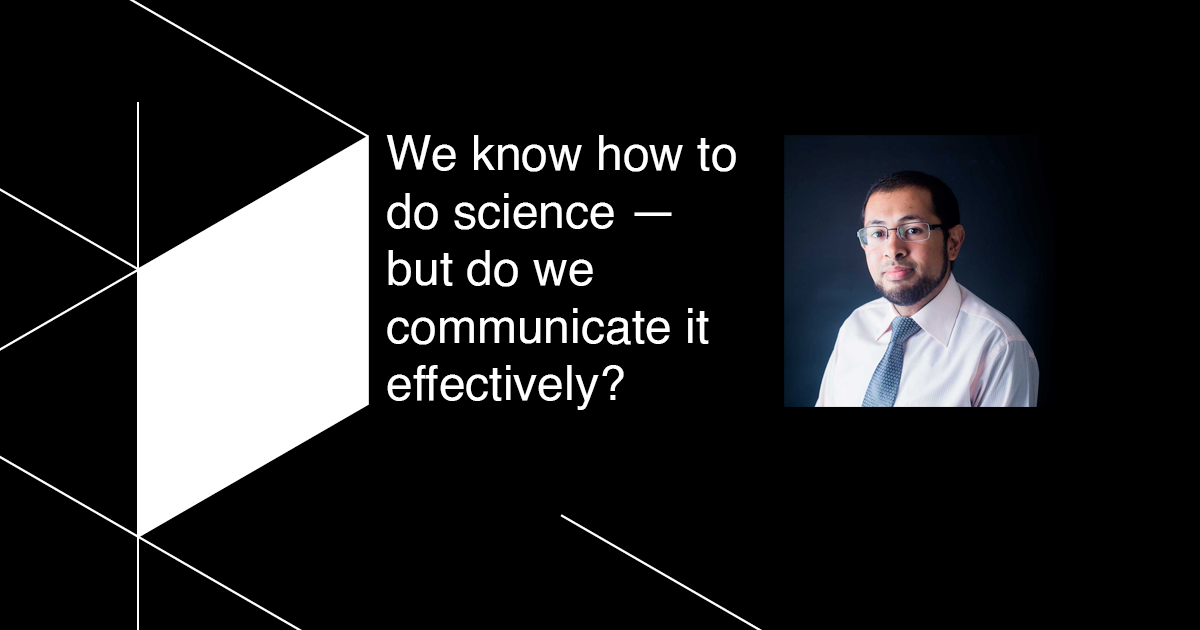We know how to do science — but do we communicate it effectively?

A conversation with Dr. Sameed Muhammed on the need to bring science closer to citizens.
An active member of IdeaSquare since the 2016 Port Hackathon, Sameed glows when he talks about the facility that "felt like an invitation" to him from the very first moment. "I immediately loved it", he says. "It was as if the IdeaSquare team would reach out to me saying: 'Bring new ideas and we'll help you out!'". Bursting with projects, Sameed very soon set out to design and execute the Ideas Circle Dinner Discussions (ICDD) —whom he run with his partner—, the Science Communication Hackathon and the Quantum Futures Hackathon, among others.
"I felt so lucky to have stumbled over a community that was willing to engage themselves in my activities and were exactly as excited as I was."
After having attended many IdeaSquare and Education/Communication/Outreach (ECO) activities, Sameed realized there was a gap between the CERN researchers and the Science Communication field. He then decided to start organizing events where he would invite speakers from the ECO department to come over to IdeaSquare and talk about their work. He managed to have 14 speakers and around 400 attendees from March until December 2019 —an unexpected success given the remoteness of IdeaSquare from ECO activities. These talks had also the goal to make people aware of IdeaSquare as a physical space because he “had the feeling that some CERN personnel didn’t always know about it".
Among the many activities that Sameed had in mind, the biggest was the Science Communication Hackathon, which he finally held in 2020 at IdeaSquare. "We spoke with Markus Nordberg and he called a brainstorming event with Ana Godinho from ECO and Emma Sanders from the Science Gateway to define the baseline topic for it", he explains. Though it had to be postponed due to the pandemic, it ended up being a major success, with attendees participating from across the globe including the US, India, and Japan.
But Sameed’s energy did not stop there. “IdeaSquare allowed me to organize very different sets of lectures on science communication”. “We scheduled one titled ‘How to build a bridge between science and institutional communications’, another titled ‘How to communicate across cultures in science-business partnerships’, ‘How does CERN measure success on social media’, and ‘Why well-intentioned science communication often falls flat’.. In these talks, Sameed would invite multidisciplinary experts to address the creation of new tools and products to make science communication “better, faster or more streamlined”.
"At IdeaSquare you can just take your idea, go to the kitchen, tell it to 15 people, and they will fix it in such a way that you can actually launch it."
But all that glitters is not gold. According to Sameed, "CERN sometimes feels a bit boxed". He states the fact that "people are mostly in their own groups or silos" and that "internal linkages are sometimes missing". "If you're in the Engineering Department, you don't know the people in Computing, and if you work in Computing, you don't know the ones in the ECO Department". In his opinion, "at IdeaSquare this is different. You can meet somebody from ECO, from IT, from the Antimatter Factory and from ATLAS, and you can all be chatting about something that none of you know about". This young scientist believes that IdeaSquare helps "to create bridges amongst different experts" and "to establish friendships in a very fundamental way".
"IdeaSquare is a place that allows me to stop thinking about my research and helps me look at the bigger picture."
Eager to find support with a next project —"a hands-on prototyping course for undergraduate students"—, Sameed is a strong advocate of teaching science in an informal context. "Students retain the information for longer", he says. "If we first show them the CERN technologies and then teach them how to 3D-print 'small souvenirs' like detectors, accelerator modules, or 3D models of CERN experiments which they can then take home, I'm sure they will remember both their visit at CERN and the technologies used here".
Sameed Muhamed is a quantum physicist specialized in antimatter. He has been working at CERN for 8 years, mostly participating in the ALPHA experiment. In addition to being a scientist, he is passionate about science communication and he has worked as a scientific disseminator for the CERN’s Visits Service, the School Lab, the Media Lab and the Education Communication & Outreach (ECO) department, amongst others. At IdeaSquare, he has attended and organized multiple science events such as the Quantum Futures Hackathon, the Science Communication Hackathon and the ICDD, the Ideas Circle Dinner Discussions.